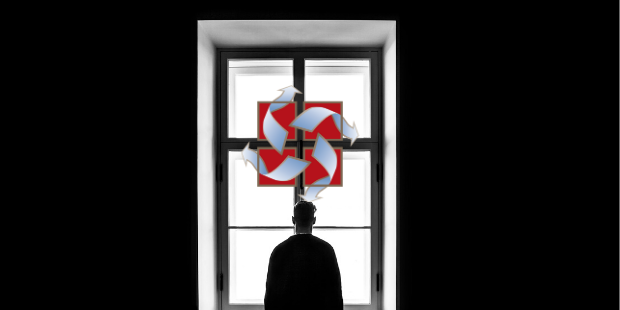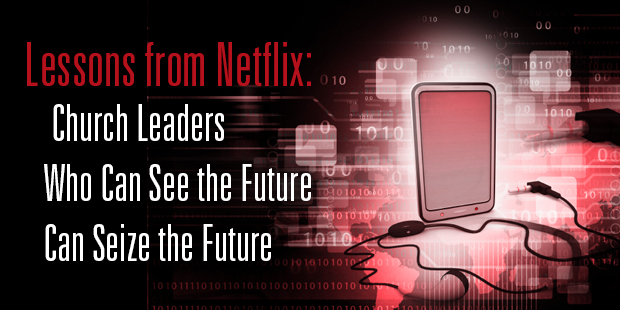Netflix and other on-demand video providers, have already changed the culture more than you think.
And they’ve probably changed you more than you think.
Remember the good old days, back in say, 2007, when people would gather around a set together to watch a TV show live when it was first broadcast?
Barely, right?
Whenever culture shifts, church leaders should pay attention.
Prudent leaders are taking notes now, because while the change will come later in the church (it always does), change is inevitable and it will be unkind to the unprepared.
5 Things Netflix Is Showing Church Leaders About the Future
So what can we learn from this? Plenty.
While it’s hard to say exactly how things will play out, the shifts are significant enough that you can begin to craft a strategy now. All of which serves the larger purpose of reaching your community with the message of Christ.
Respond, and you won’t be left wondering what happened.
Ignore the change, and you’ll be like an encyclopedia salesperson wondering why no one wants to answer the door anymore.
Church leaders who see the future can seize the future.
So, here are 5 things ways the changes Netflix (and the like) have brought about will impact the future church:
1. Live, simultaneous viewing is waning
About the only thing many people watch live now is sports, particularly if you monitor the viewing habits of people under 40.
Even regular shows people track with are often DVR’d so people can skip through commercials. Personally, even though I’m over 40, I rarely watch network television, but when I do, I’ll record a show and start watching it 15-20 minutes late so I can skip through the commercials.
A few implications for church leaders:
- Will once on Sunday seem strange? People are increasingly used to listening to your content on their schedule. If your main draw on Sunday morning is the message, offering it only once live on Sunday will not resonate as much in the future as it has in the past. While this might not mean adding more services (extra services with 12 people each attending is not compelling), it does force you to reconsider what you’re doing and why you’re doing it.
- Relationships and mission will be more powerful than singing and speaking. The gathering of the church at its best has always been about more than just a service or even a message on Sunday. The church is community on a common mission in which relationships with insiders and outsiders are central.
Churches that elevate relationship—both for new attenders and regular attenders—will see far more effectiveness in the future than churches that don’t.
In fact, you might even see more people drawn to your services not just for the services, but for the relationships and for a chance to make a difference working together on a common mission that makes a difference.
If all you do is sing and speak on a Sunday, it will become harder and harder to gather a crowd.
If you want to read more about the importance of relationships on Sunday and how to respond to declining attendance, this post on 7 Ways To Respond As People Who Attend Church Attend Less Oftencan help.
2. Watching is becoming personal, individual and portable
Like you, I now consume content on multiple devices. I can watch TV, movies and Netflix on my phone, iPad, laptop, desktop or TV.
And, like you, I simply pick up where I left off. Stop a show at 33:23 on one device and pick up at 33:24 on another, whenever you want. Start at the gym, finish in the car or on the back deck.
Recently Netflix began to allow subscribers to create individual users on a common account so your kids or spouse can watch what they’re watching and you can watch what you’re watching without messing up each other’s feed. As a result, various members of a household may be watching the same series, but will be at different places in a series.
The implication for church leaders is that one more shift from the communal to the individual is happening.
So what on earth does that mean?
Great question, because it tears at the fabric of what the church is about—a community.
Some thoughts:
- It’s an opportunity for people to access your content the same way. Like many churches, a few years ago we created an app for Connexus that allows people to stream messages whenever and wherever they want across devices. Our content is available on our website as well, in addition to via podcast. Accessing your messages will become more personal, individual and portable. Embrace it. I realize that this sometimes mean people will watch online rather than attend, but it’s also a great way to spread the message more quickly than otherwise. People who love what you do will share it with their friends and talk about it on social media.
- Still call people to something greater. As people’s experience of content consumption on an individual level becomes more prevalent, the need for community still won’t go away.
We’re more connected than ever as a culture, and many people are more lonely than ever.
As much as people want individualized access to content, they also want to be part of something bigger than themselves. Mission-driven, mission-focused and relationally rich churches will call draw in people longing for something bigger and more significant than themselves.
Churches can call people to something far greater than themselves. So do it!
3. There’s a market for binge watching
Binge watching is increasingly normal. Although it may have started back in the 80s or 90s when people lined up VCR tapes or DVDs and watched them in a marathon session, now it’s just far too easy to press ‘play’ from your couch without ever getting up.
Since Netflix streams entire series commercial free, you can easily power through several seasons of Suits, Downton Abbey, Game of Thrones or House of Cards in a day or even a week.
New seasons of series are now being released all at once rather than episode by episode (week after week) as in the past, again resulting in binge watching for many viewers.
The implications for church leaders are actually quite good on this one.
People will consume really great content in marathons, including yours. Your audio podcast could become a place where people go through entire series in short spans of time on their commute or while working out. Your video podcast could become the subject of binge viewing. Ditto with your website. Some churches like North Point are even building microsites around each series, like this one.
Bottom line? Make sure your content is accessible in the easiest forms possible for people to access.
4. Great stories are alive and valued
It’s fairly widely accepted that the best content being produced these days is not coming from Hollywood or even network TV, but from specialty channels like AMC, Comedy Central, USA network and Netflix itself.
Shows like Madmen, Breaking Bad and others win the ratings wars because of their rich plot lines, complex characters and willingness to take a viewer seriously. They don’t dumb down.
Many critics believe TV has become what movies used to be: a forum in which great stories are told.
The church, as I think most readers of this blog might agree, sits on the very best message on the planet.
The implication: tell the story….well.
The Gospel has always been about God’s story intersecting with the human story. The church is uniquely positioned to tell the best story of all.
So do it, well.
Clearly people are looking for a better story. Church leaders need to bring it to them.
5. People will pay for something they don’t use, until one day, they won’t
I realize I pay almost $100 a month for something I almost never use—network TV. I rarely watch it anymore.
I hold out and pay the monthly bill because I might watch the World Series or the Superbowl. I don’t like the illegal options (I don’t do illegal downloads) and watching live sports in Canada legally without subscription TV is more difficult than in the US.
But seriously…$1200 a year in case I might watch something? I could almost fly to the World Series for that.
For the first time in the US, traditional television subscriptions declined year over year as people cut the cord.
This is only going to accelerate.
If your entire church model is built on people coming together at set times to ‘consume’ content, how long will it be until people eventually wake up and realize they are paying for something they rarely ‘use’?
This is a bit of hyperbole, of course, when it comes to the church. Because the church is SO much more than a common gathering around content. Except that sometimes it’s not. It should be, but it’s not.
If you are simply try to attract people to a one hour event that people increasingly don’t attend, you will always struggle financially. People will support something they don’t attend until one day, they won’t.
The good news? Mission-centered, mission-focused churches will not be impacted by this. A church that has a white-hot sense of mission will almost always have the resources it needs to do what the church is called to do. But churches who want to prop up what used to sort-of-work, won’t.
So focus on your mission. Focus on your purpose.
Call people to something greater than themselves.
Personally, I’m fascinated by these cultural shifts and would love to hear your take on what you see happening and how you are responding or think the church should respond.
>> Read more from Carey here.

Tags: Carey Nieuwhof, Future
|
What is MyVisionRoom? > | Back to Leadership >























